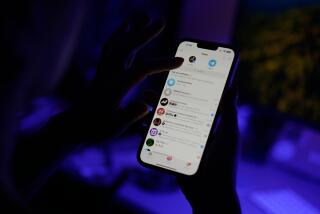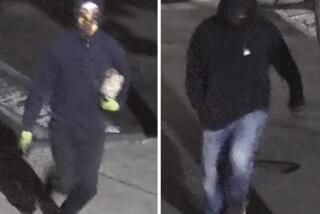2 JDL Leaders Are Indicted by U.S. Grand Jury
- Share via
A federal grand jury indicted leaders of the militant Jewish Defense League on Thursday on charges of plotting to bomb the Muslim Public Affairs Council in Los Angeles, the King Fahd mosque in Culver City and a field office of U.S. Rep. Darrell E. Issa (R-Vista).
Irv Rubin, the JDL’s national chairman, and Earl Krugel, the group’s West Coast coordinator, could be sentenced to life in prison if convicted on the most serious charges in the nine-count indictment.
The pair, arrested by the FBI last month, were charged with conspiring to use a weapon of mass destruction against a U.S. government office, which carries a maximum life term.
They also face charges of conspiracy, possession of a destructive device, attempted arson, possession of illegal weapons, and soliciting another JDL member to carry out the bombings.
Defense lawyers said the charges are overblown, and they accused prosecutors of succumbing to hysteria after the Sept. 11 terrorist attacks.
The indictment outlined the roles that Rubin and Krugel allegedly played in the plot, and offered new details about the events that culminated in their arrest Dec. 11. That came after a JDL member who became an FBI informant delivered five pounds of explosive powder to Krugel’s home in Reseda.
Rubin, it said, chose the locations to be bombed and decided when the attacks would occur.
Krugel, his second in command, recruited the putative bomber and sent him on shopping trips to buy the metal pipes and explosive powder that would be used to build the bombs in Krugel’s garage, according to the indictment.
The informant, described only as someone who joined the JDL in his teens, told investigators that he was recruited during a meeting with Rubin and Krugel on Oct. 19 in which the two leaders discussed their intention to bomb buildings “associated with Arab religious or political institutions.”
Rubin, the indictment said, wanted to target the Muslim Public Affairs Council, which has an office in a high-rise in the mid-Wilshire district, while Krugel had a list of mosques throughout the Los Angeles area.
Afterward--the exact date has not been disclosed--authorities said, the JDL recruit contacted the FBI and agreed to wear a concealed tape recorder during future contacts with Krugel and Rubin.
The indictment gave this chronology of subsequent meetings:
On Oct. 29, Krugel instructed the informant to take photographs of the Muslim Public Affairs Council to determine the best way to bomb its offices.
On Nov. 4, Krugel told the informant they could build the bomb in his garage. He advised the informant to carry it to the Muslim Public Affairs Council office in a paper bag to avoid attracting attention.
On Nov. 8, Krugel told the informant what brand of gunpowder to buy and promised to show him what type of pipe to purchase.
On Nov. 14, Krugel advised the informant to use gloves when handling the bomb materials to avoid leaving fingerprints.
On Dec. 7, Krugel made plans to go shopping with the informant for the bomb components, telling him that Dec. 13 was the target date for bombing the Muslim Public Affairs Council. Krugel said, however, that Rubin had the final say.
On Dec. 11, Rubin changed the plan, telling the informant he wanted him to bomb the King Fahd mosque in Culver City and Issa’s field office. Investigators believe Issa’s San Clemente office was the target. At the same meeting, Krugel told the informant to deliver the explosive powder to his home later that day.
FBI agents arrested Rubin and Krugel soon after the informant dropped off the gunpowder.
Krugel’s lawyer, Mark Werksman, called the charges “overblown.” Referring to Sept. 11, Werksman said, “This indictment is being brought under a cloud of hysteria which has impaired the judgment of law enforcement and the prosecution.”
Krugel and Rubin, who are being held in solitary confinement at the federal detention center in Los Angeles, will be arraigned Jan. 22 in U.S. District Court, according to Assistant U.S. Atty. Gregory Jessner.
More to Read
Sign up for Essential California
The most important California stories and recommendations in your inbox every morning.
You may occasionally receive promotional content from the Los Angeles Times.













